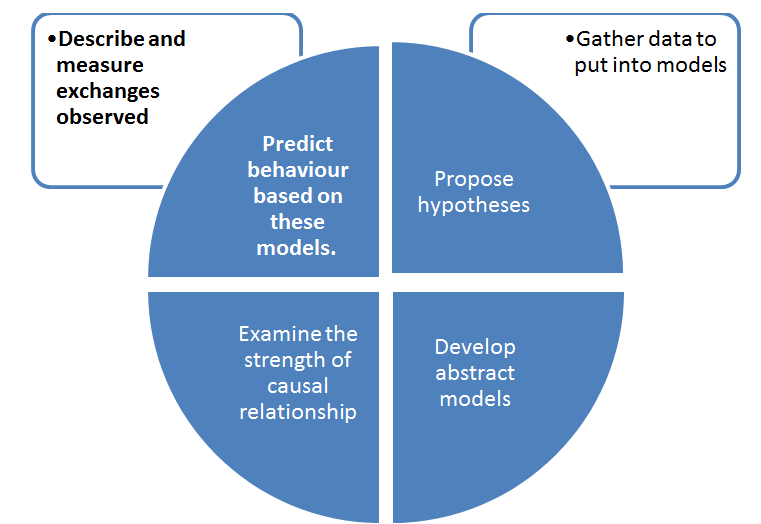Handout: The Nature of Economics
17th September 2015
The Nature of Economics
Economics focuses on the study of the ownership; the use and the exchange of scarce resources using scientific methods. In essence, Economics is the study of scarcity.
Economics is a social science because it employs scientific methods to develop theories which can be used to explain the way that individuals, society and organisations behave. Economics offers an explanation for economic behaviour when scarce resources are exchanged.
Economists, like other social scientists cannot carry out controlled experiments in the way that physical sciences can. In order to study economic behaviour, economists have to rely on observation and deduction based on their observations. Economists also seek to construct abstract models. The abstract models which economists use are simplified models based on generalisations in order to understand how the economy functions and how economic agents act and react.
Ceteris Paribus
One of the difficulties facing economists is that in the real world economic variables are subject to constant change. An example of this is the factors affecting the demand for goods and services. Prices may fluctuate, tastes may change and incomes may also vary. It is quite possible that these economic variables may all change at the same time. Examining cause and effect may be very difficult with so many changes occurring simultaneously. For this reason, economists use the rule of ceteris paribus to develop simplified models. Under this rule the assumption is made that only one variable will change at any one moment in time.
Ceteris Paribus Rule
‘All other things remain the same’
Methods
The study of economics
The study of economics addresses three key questions:
Like other social sciences, economics has developed different strands for investigation. For example, economists have focused on micro economics and macro economics; applied and pure economics; environmental economics; development economics and competition theory. All these areas of study have a common thread: the development of an understanding regarding why and how exchange occurs and an examination of the benefits and the costs for those involved.
The role of economists
Economists use the knowledge of economic principles and economic theories to analyse the current state of the economy in order to provide advice to business, public sector organisations and government. This information can be used in resource allocation. By gathering and analysing data economists can help to reduce risk. The data collected is only useful if it is applied to an economic model and used to inform decision taking.
Economists can use their expertise to offer informed guidance about alternative options and to offer an assessment regarding the costs and benefits of decisions taken.
| Goods and services refer to:
• Final Goods and services — those products that are directly consumed by individuals to satisfy their needs and wants. • Intermediate or Capital Goods — are those goods used to produce other goods. Needs represent those goods and services required for human survival. Needs are determined by nature, climate and region, and are often finite. Human wants are determined by society and the culture in which an individual lives. These wants are indeed unlimited and represent the source of the problem facing all economic systems. |
Positive economics
Economics seeks to use the principles and methods of science in order to explain economic behaviour. Economists make positive statements about the economic world. Positive statements are factual and are capable of being verified. For example:
‘The economy has grown by 2% during the last year …..’
‘Sales of new cars fell by 15% in the first quarter of last year………’
Economist tend to word their statements very precisely and are exact in their statements. Unlike the general population they will seek to avoid normative statements. Normative statements are based on opinion and, or, prejudice. They are difficult to test and are unscientific. Examples of normative statements are:
‘Those individuals on higher salaries will be motivated to work harder than those individuals on the minimum wage…….’
‘Reducing prices will lead to excess demand………’
‘Better qualified workers earn more than unskilled workers……’
Economics can be defined as the study of social behaviour directing the allocation of scarce resources to meet the unlimited needs and desires of the individual members of a particular society.
Economics seeks to develop and understanding of how individuals interact within the social structure to address key questions regarding the production and exchange of goods and services. Firstly it seeks to understand how individual needs and desires are communicated so that the correct mix of goods and services is made available? Secondly, Economics seeks to explain how a society provides incentives for individuals to participate in the production of the goods which society desires. Thirdly, Economics seeks to explain how production is organized so that maximum-possible quantities are made available within the constraint of existing resources and production technology? Finally, Economics seeks to explain how goods are exchanged.
Economics uses models to explain how markets operate and how scarce resources are combined to produce the goods and services society requires. Resources are referred to as the factors of production:
- Land (acreage and raw materials)
- Labour (unskilled, semiskilled, professional)
- Capital (machines, factories, transportation equipment, and infrastructure) and
- Entrepreneurship (organizing factors of production and risk-taking)
The problems facing all societies is that while wants are infinite, resources are finite. Inevitably this means that we live in a world of scarcity. Scarcity refers to a physical condition where the quantity desired of a resource exceeds the quantity available in the absence of a rationing system.


0 Comments